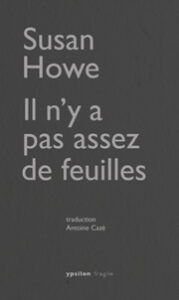
Il n’y a pas assez de feuilles – Susan Howe
Publication | Critiques
Résumé
Saisir un double mouvement, du poème vers l’histoire et de la vie vers la littérature, pour entrer dans des espaces qui s’imbriquent et nous font traverser l’Océan et la Guerre, c’est l’enjeu de ce livre. Face à une langue intimement attachée à ses origines et à ses littératures anglo-saxonnes, l’écoute se fait attentive et le regard alerte pour capter le plus grand nombre d’accords possibles. Ainsi les poèmes de Susan Howe nous plongent dans un état imaginaire du langage, où les liens sont à la fois détruits et réinventés ; la lectrice et le lecteur doivent alors reconstituer les articulations et abandonner les conventions, ne pas se fier aux lieux communs mais avoir foi en une langue à reconquérir.
« Je crois qu’en murmurant simplement des mots dans un ordre spécifique il se produira quelque chose par un chemin associatif au niveau de la vie. »
Lire un extrait : http://ypsilonediteur.com/fiche.php?id=185
Critiques
- “This important volume from an authoritative international team of authors sheds significant new light on the comparative development of post-war Conservatism in the western world.”
– Stuart Ball, Professor Emeritus, University of Leicester, UK - “The rich essays collected in this illuminating volume show that the rise of right-wing politics in the United Kingdom, the United States, and France since the 1970s was a remarkably transnational phenomenon. As they attacked social democracy and cultural pluralism, right-wing movements borrowed ideas, visions, vocabularies, and tactics from each other, adapting them to their own national idioms and using advances in one country to win advances elsewhere. Anyone interested in confronting the problems that have proliferated in the wake the right’s reconfiguration of politics – surging inequality, belligerent ethno-nationalism, worker disempowerment and insecurity, and lost faith in the capacity for democratic self-government – has much to learn about the origins of these problems from this important book.”
– Joseph A. McCartin, Georgetown University, USA, author of Collision Course
